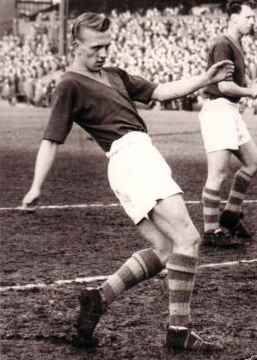

Crowe: Christopher (Chris)
1956-1960
(Player Details)
Winger/Inside Forward
Born: Newcastle-upon-Tyne: 11-06-1939
Debut v Burnley (a): 20-10-1956
5’71/2” 11st 11lb (1957)
Crowe had the distinction of representing Scotland at Schoolboy level and England as a
full International. Born in Newcastle, he moved to Edinburgh with his parents at an early
age. He joined Leeds as an amateur in October 1954. He won eight England Youth Caps and
turned professional in June 1956. He soon broke into the Leeds first team in the 1956-57
season when only seventeen, and it soon became obvious that he was a very talented player.
He was second on the Leeds goalscoring list with twelve League goals in 1958-59, with Alan
Shackleton getting four more and he was again second in the following season with eleven to
John McCole's twenty-two. He had made a scoring debut for the England Under-Twenty-Three
team in the 2-0 win over France at Roker Park, Sunderland on 11th November 1959 and it
came as no surprise when other teams started to covet the young Leeds star. In January 1960
Wolves manager Stan Cullis and Aston Villa manager Joe Mercer competed to sign the Young
England winger, who was away on National Service, for around £30,000. Crowe agreed terms
with Cullis but stalled. After consulting his wife the transfer fell through. He then won a
second Under-Twenty-Three cap in a 4-4 draw with Scotland at Ibrox Park on 2nd March 1960,
which only heightened the interest of other clubs. Leeds, meanwhile, were delighted by the
form of Crowe's stand-in, seventeen-year-old Billy Bremner, and he progressed so well, that
within a couple of months manager Frank Taylor felt able to part with his prized asset.
Blackburn Rovers stepped in with the sizable bid of £25,000 and Taylor felt obliged to accept.
Crowe had potential, but was often unnerved by heckling from the fans, and allowed his form
to suffer because of this undeserved distraction both at Elland Road and at Ewood Park. He did,
however, still figure in the plans of the England team and was picked twice more for the
Under-Twenty-Three side while at Ewood Park. On 8th February 1961 he scored again, this time
from the spot as England beat Wales 2-0 at Goodison Park, Liverpool, but the was on the losing
team for the first time at Under-Twenty-Three level as England were beaten 1-0 by Scotland in
his fourth and final game for England on 1st March 1961 at Ayresome Park, Middlesbrough. He
left Blackburn on 14th February 1962 for £28,000, after scoring just six goals in fifty-one
League games. He was very close to selection for the 1962 World Cup tournament in Chile,
having been very impressive since his arrival at Molineux the previous February. In a
struggling side who were to finish no higher than eighteenth in the First Division, Crowe
scored seven goals in fourteen matches, including two in an astonishing 5-4 win at Chelsea,
which was Wolves’ only victory in the last ten games of the season. Despite similar good
showings in London, which always help in getting international recognition, the former Leeds
and Blackburn player lost out to the likes of Johnny Haynes, Bobby Charlton and the mercurial
Jimmy Greaves in selection for the trip to South America. Crowe’s time, albeit brief, was soon
to come, though. Wolves started the following campaign brilliantly with an 8-1 trouncing of
Manchester City and were top until beaten and deposed by eventual champions Everton in early
October. Crowe scored five times in the first seven games, including both in a win at Blackpool
and one of the two that defeated the best team of that moment, Tottenham Hotspur, in front of
61,412 at White Hart Lane. It was then that he realized his true potential and was rewarded by
winning his first and only England cap against France on 3rd October 1962 in a European
Championship qualifying game at Hillsborough, Sheffield, as England drew with France 1-1. His
Wolves team-mate Alan Hinton was a fellow debutant and a third Molineux man, Ron Flowers, scored
from a penalty in the 1-1 draw. Crowe would go on to score eleven goals in all in 1962-63 and
register three in four games in another hot start in 1963-64. But, surprisingly, he never won
another cap. He went on to scored twenty-four goals in eighty-three League appearances for
Wolves. In August 1964 Nottingham Forest signed him for £30,000, when Crowe was still only
twenty-five and he stayed with them until January 1967 when he moved to Bristol City for £15,000,
after scoring twelve goals in seventy-three League games, together with two goals in three F.A.
Cup ties and one in two appearances in the League Cup, while at the City Ground. He scored
thirteen goals in sixty-seven League games at Ashton Gate before, in May 1969, he went to
Australia to play for Auburn FC. He soon returned to England in September 1969 to join Walsall
for £1,000, where he finished his League career in 1970 after scoring once in thirteen games. He
ran a pub in Leeds and a Newsagent’s shop in Bristol before coming out of retirement to play for
Bath City in February 1971. He then managed Greenway Sports and Norwegian side Fram. He then
settled in Bristol, where he ran a shoe shop, then was an estate agent and before becoming a taxi
driver. He died Bristol in May 2003.